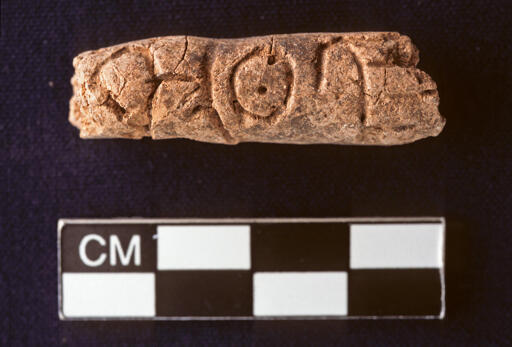- cross-posted to:
- archeology
- [email protected]
- cross-posted to:
- archeology
- [email protected]
Archive link: https://archive.ph/cIz4A
It’s dated to be from around 2400 BCE. The article doesn’t clarify if it’s a true alphabet or an abjad, but either way it’s interesting.
EDIT: see also https://www.scientificamerican.com/article/worlds-oldest-alphabet-discovered/ for a less pop-linguistics narrative of the same discovery.
This press release is pretty crap, but there is more info here: https://www.scientificamerican.com/article/worlds-oldest-alphabet-discovered/
I’m going to add this to the OP, thanks for sharing it!
While this discovery is very cool, this bothered me:
“Alphabets revolutionized writing by making it accessible to people beyond royalty and the socially elite. Alphabetic writing changed the way people lived, how they thought, how they communicated,”
Ancient Chinese scripts seemed to manage just fine, even during their “writing is magical and only the rich are smart enough to know that magic” phase. Is it possible that the alphabet itself didn’t change the way people lived, but perhaps the people who introduced it to the area changed the way the original inhabitants lived? The conclusion that the alphabet was the cause just seems really Western exceptionalist to me.
Pop linguistics is prone to those inaccuracies, by oversimplifying complex matters. Thanks for pointing it out.
It’s a bit easier / faster to learn how to use a phonetic/phonemic writing system (alphabets, abjads, abugidas, syllabaries…) than it is to learn a logographic system.
Japanese has a good example of that - children at age 6 are taught hiragana (syllabary), katakana (syllabary) and kanji (logographic). While they’re expected to have learned the first two by the end of the year, it takes them around 6 years to learn the 1000 kanji expected for reading proficiency.
But that’s it; calling it a “revolution” is a big stretch. Specially when even logographic systems show some developments in this direction, with hieroglyphs for example showing phonograms all the time, and the modern Han writing system having both semantic and phonetic parts (granted, they only work 100% for Middle Chinese, and certainly not for non-Sinitic languages like Japanese, but still).
Removed by mod
You think the dividing line between us and animals is writing? There were pre-writing civilisations last century. You’d have fit right in with the morals of the time.
Wow, I can’t believe my comment about my appreciation of the humility impressed upon me by historical perspective was deleted. Being reminded of how new writing is fascinating and gives me peace (and I’ve been needing more of that lately). Linguistics itself is so cool, but knowing how recent some developments are adds greatly to my understanding of my own existence and adds a deeper meaning to my life.
I also can’t understand why you’re interpreting my comment so extremely. Your point further illustrates how young humans are as phenomenon in the universe. It’s obviously not the only dividing line. And we’re likely never going to be truly separate. Parts of our brain and nervous system are always going to overlap with our relatives in the animal kingdom. And animals have shown higher order thinking, tool use, and compassion often associated more with humans.
Edit: Okay, I see that my drop of politics within a much bigger point was enough to get the comment deleted.
Here’s a censored version that avoids the politics:
This, strangely, puts me more at ease about my existence and the struggles of our world. It’s been less than 10,000 years that humans have had writing. We’re barely beyond being just animals. It makes sense that other things in the world aren’t perfected yet. We’ve got a lot of learning to do.
This discovery affected me on a personal level to give me hope for the future. It helps me to be more forgiving of myself and others. Isn’t the date of the observation significant? Not just the symbols in and of themselves?
That’s not a linguistic observation, but the pursuit of knowledge (such as linguistics) doesn’t exist in a vacuum separated from the context, interest, and desires of individuals.
Edit 2: I’m realizing my censored version leaves out the use/misuse of language to gain power. The discovery that prompted this article shows that writing is a new tool in human existence. Being reminded of its newness, made me more aware that I should perhaps be more open to us all still needing practice at using this tool. This observation is unfortunately tied to the context that prompted it. But, to me, it gives studying history and linguistics more value and seemed like it was worth discussing. Hopefully, I’ve now expressed my ideas clearly without bringing politics into it.
Hopefully, I’ve now expressed my ideas clearly without bringing politics into it.
I think that you did. I wasn’t the one removing your comment (I was discussing elsewhere, then sleeping), but I 100% agree with the removal; it’s that sort of stuff prone to derail discussion to things outside linguistics.
That said I don’t think that writing being so recent has much to do with our propensity to be misinformed. Without writing, perhaps we’d be misinformed through lore instead. Or even gossips. We’re probably still being misinformed this way, even with writing.
Yeah, the rule is clear, and I understand the danger.
My thoughts about the newness are that perhaps we’re too trusting if it’s written it must be true. Like we do with TV and the internet. We all stronger critical thinking, and that takes practice.
No sane Middle Eastern language would use a true alphabet, so probably an abjad.
That’s more like a common pattern than a sure way to know it.





